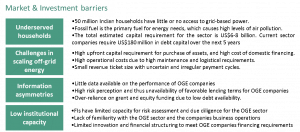At a Glance
| Strategic Outcomes | |
|---|---|
| Start Date | Q1 2017 |
| End Date | |
| Funding Source | Core |
| Actual Budget (USD) | 0 |
| Budget Percentage | % |
| Actual Expenditure (USD) | |
| Status | Complete |
| GGGI Share (USD) | |
| Poverty and Gender Policy Markers | |
| Name of Client (Lead/Prime implementer if GGGI is part of a consortium) | |
| Participating Organization (Funding/donor) | |
| Name of consortium members, if any | |
| Thematic Area |
|
GGGI Project Code :
Project Manager and Staff +
Project Rationale
India’s INDC emphasizes the government’s goal of ensuring Electricity for All – The Indian government has promised to provide 24×7 electricity to all by 2019. At present, close to 50 million Indian households have little or no access to power. India has an electrification rate of 78.7%, with a large proportion of the underserved households concentrated in rural areas (DDDUGJY October 2016). The lack of energy access is particularly pronounced in the states of Bihar, Madhya Pradesh, Odisha, Uttar Pradesh and Assam. Kerosene and diesel are the primary fuels for meeting energy needs, which causes high levels of air pollution.
OGE companies can play an important role in improving access to energy for un-electrified households in India. The demand for OGE systems from end-consumers is high because of accessibility to cheaper and cleaner energy sources. The total capital requirement for the access to energy sector in India has been estimated to be US$6 – 8 billion (cKinetics 2017).
Table 1: Off-grid energy sector capital demand
| OGE Sub-segment | Estimated market size (No.) | Estimated capital demand |
| Pico, Micro and Mini-Grids | 5,000 mini-grid systems | USD 500 million (over the next 5 years) |
| Solar Pumping | 1 million pumps (over next 5 years) | USD 5 – 7 billion (over the next 5 years) |
| Solar Home Lighting Systems | 200,000 households (annually) | USD 50 – 75 million (current annual demand) |
There are close to 100 companies operating within the different OGE market segments – solar home systems, mini-grids, pico-grids and solar irrigation. However, most of the existing companies are small and are not able to grow their operations profitably. The primary reason for this has been identified as unavailability of debt capital at appropriate terms and conditions from domestic lenders.
Around 20 companies have been assessed to be debt ready with credit enhancement support (cKinetics 2017). These companies are on a growth track and are now operational for 2-3 years. The sector requires close to US$180 million in low cost debt with up to 8-year tenor over the next 5 years as growth capital. The FIs still maintain a high-risk perception on the off-grid energy sector and thus do not offer capital with required terms and conditions.
Building on 2015-2016 work
During the scoping phase in 2016, GGGI conducted a detailed assessment of challenges faced by the off-grid energy sector in India, engaging key stakeholders and government counterparts, where lack of debt capital was identified as the most critical barrier. In the 2017-18 WPB, a GGGI-designed innovative debt fund will unlock the decentralized renewable energy market by making available capital to enterprises for capital expenditure and working capital requirements, and at the same time help develop an ecosystem of investors, lenders, and development institutions.
Planned Results
• Increased local currency lending to the off-grid energy sector by domestic financial institutions
• 1.5 million households are provided with electricity access
Privacy Overview
| Cookie | Duration | Description |
|---|---|---|
| cookielawinfo-checkbox-analytics | 11 months | This cookie is set by GDPR Cookie Consent plugin. The cookie is used to store the user consent for the cookies in the category "Analytics". |
| cookielawinfo-checkbox-functional | 11 months | The cookie is set by GDPR cookie consent to record the user consent for the cookies in the category "Functional". |
| cookielawinfo-checkbox-necessary | 11 months | This cookie is set by GDPR Cookie Consent plugin. The cookies is used to store the user consent for the cookies in the category "Necessary". |
| cookielawinfo-checkbox-others | 11 months | This cookie is set by GDPR Cookie Consent plugin. The cookie is used to store the user consent for the cookies in the category "Other. |
| cookielawinfo-checkbox-performance | 11 months | This cookie is set by GDPR Cookie Consent plugin. The cookie is used to store the user consent for the cookies in the category "Performance". |
| viewed_cookie_policy | 11 months | The cookie is set by the GDPR Cookie Consent plugin and is used to store whether or not user has consented to the use of cookies. It does not store any personal data. |
